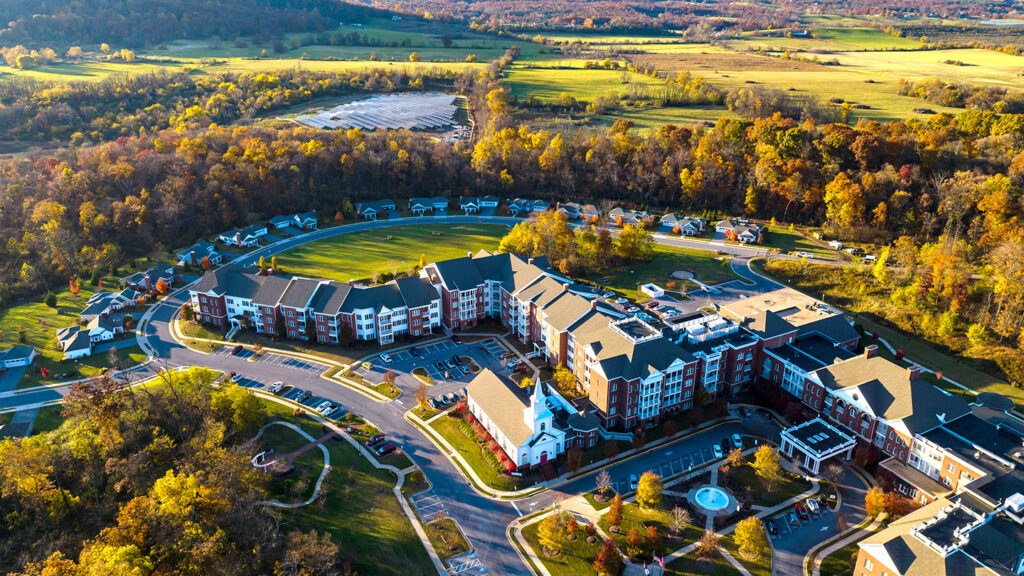
A seven-acre solar panel project and a vinyl siding recycling program are among the latest sustainability initiatives from senior living operators.
Tuesday, The Village at Orchard Ridge, a National Lutheran Communities & Services life plan community in Winchester, VA, hosted a ribbon cutting on its 1.85-megawatt solar project. The effort marks a significant step toward the provider’s commitment to environmental sustainability and achieving 100% clean, renewable energy usage across its five communities in Maryland and Virginia.
The ground mount solar project will meet 85% of the community’s energy needs. The panels are expected to produce an estimated 2,396 MWh of energy annually, enough to power approximately 330 homes.
Additional environmental benefits, according to NLCS, include 1,862 tons of carbon dioxide avoided, 364 cars off the street, 190,328 gallons of gasoline avoided and 73,215 trash bags of waste recycled.
“Not only does it reduce greenhouse gas emissions and lower energy costs, but it also gives our residents an opportunity to be proactive in environmental initiatives,” said Richard Mazza, executive vice president of business planning and development. “We’re happy to serve as a model to other life plan communities of what’s possible when it comes to what many non-profits may consider beyond their reach or expertise.”
The project began last July in partnership with DSD Renewables, a renewable energy company. Both entities worked with a local utility company to implement design and engineering solutions with minimal disruptions for the community’s 400-plus residents.
Along with the solar field, the project also includes the installation of four electric vehicle charging stations on the community’s 132-acre campus. The charging stations will be available to both residents and visitors, with one station in the community’s service area to power its own fleet.
Other energy efficiency projects initiated by NCLS include geothermal wells, LED lighting, energy-efficient boilers, green roofs and microbiorention systems — a water filtration system that treats runoff by passing it through a filter bed mixture of sane, soil and organic matter.
Renovation recycles vinyl siding waste
In Newtown Square, PA, White Horse Village took part in a sustainability initiative to recycle 45,000 pounds of PVC vinyl siding during a campus-wide renovation.
The renovations include new siding, stonework and windows for 186 residences as part of a larger master plan. The vinyl recycling program kicked off last year with exterior renovations to 70 garden cottages, and it continues this year as work begins on 116 villas this spring.
As new siding is installed, the old tear-offs and construction scraps are collected and placed in storage bins by R. Titter Roofing. Building product manufacturer CertainTeed is piloting a closed loop recycling process in which it crushes and bales the collected materials, which then are transported to a recycling partner for repurposing into raw material for new siding and other vinyl products.
“During the two phases of renovations at White Horse Village, we will divert at least 140,000 square feet of scrapped vinyl siding weighing more than 45,000 pounds from landfills,” R. Titter Roofing owner and General Manager Tim Julsik said.
Repurposing siding waste and cut-off as raw materials in production is essential to CertainTeed’s sustainability initiatives and its goal to be carbon neutral by 2050, according to Perrick Le Mens, circular economy program manager. Le Mens added that the White Horse Village project will provide valuable lessons in effective transportation to material storage. The CertainTeed vinyl siding recycling program launched last year and remains in the pilot phase with projects in Illinois, Ohio and Pennsylvania.
Other White Horse Village sustainability initiatives include the use of environmentally friendly building materials, low-flow water fixtures, high-efficiency lighting and organic turf.




